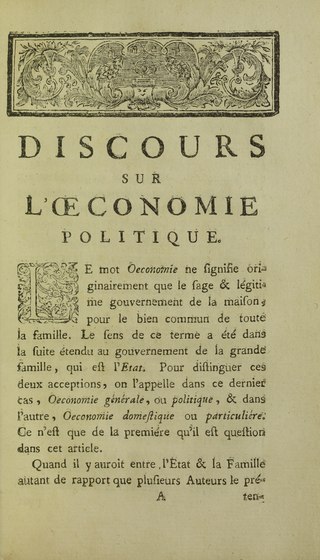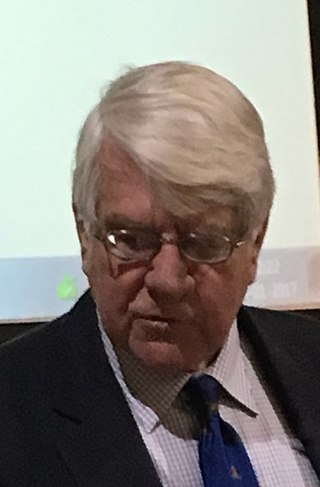Related Research Articles

Political economy is a branch of political science and economics studying economic systems and their governance by political systems. Widely studied phenomena within the discipline are systems such as labour markets and financial markets, as well as phenomena such as growth, distribution, inequality, and trade, and how these are shaped by institutions, laws, and government policy. Originating in the 16th century, it is the precursor to the modern discipline of economics. Political economy in its modern form is considered an interdisciplinary field, drawing on theory from both political science and modern economics.
Private property is a legal designation for the ownership of property by non-governmental legal entities. Private property is distinguishable from public property, which is owned by a state entity, and from collective or cooperative property, which is owned by one or more non-governmental entities. John Locke described private property as a Natural Law principle arguing that when a person mixes their labor with nature, the labor enters the object conferring individual ownership.

Law and economics, or economic analysis of law, is the application of microeconomic theory to the analysis of law. The field emerged in the United States during the early 1960s, primarily from the work of scholars from the Chicago school of economics such as Aaron Director, George Stigler, and Ronald Coase. The field uses economics concepts to explain the effects of laws, to assess which legal rules are economically efficient, and to predict which legal rules will be promulgated. There are two major branches of law and economics; one based on the application of the methods and theories of neoclassical economics to the positive and normative analysis of the law, and a second branch which focuses on an institutional analysis of law and legal institutions, with a broader focus on economic, political, and social outcomes, and overlapping with analyses of the institutions of politics and governance.
The Chicago school of economics is a neoclassical school of economic thought associated with the work of the faculty at the University of Chicago, some of whom have constructed and popularized its principles. Milton Friedman and George Stigler are considered the leading scholars of the Chicago school.

The University of Chicago Law School is the law school of the University of Chicago, a private research university in Chicago, Illinois. It employs more than 180 full-time and part-time faculty and hosts more than 600 students in its Juris Doctor program, while also offering the Master of Laws, Master of Studies in Law and Doctor of Juridical Science degrees in law.
Guido Calabresi is an Italian-born American jurist who serves as a senior circuit judge of the United States Court of Appeals for the Second Circuit. He is a former Dean of Yale Law School, where he has been a professor since 1959. Calabresi is considered, along with Ronald Coase and Richard Posner, a founder of the field of law and economics.
Wage regulation refers to attempts by a government to regulate wages paid to citizens.

William M. Landes is an American economist who has written about the economic analysis of law and an emeritus professor at the University of Chicago Law School. He is a fellow of the American Academy of Arts and Sciences, which cited him for his work in the field. He is among the most cited law professors in American law reviews. Landes also is the original founder of Lexecon, a legal and economic consulting firm.

Eric Andrew Posner is an American lawyer and legal scholar. As a law professor at the University of Chicago Law School, Posner has taught international law, contract law, and bankruptcy, among other areas. He is the son of retired Seventh Circuit Judge Richard Posner.

Elinor Claire "Lin" Ostrom was an American political scientist and political economist whose work was associated with New Institutional Economics and the resurgence of political economy. In 2009, she was awarded the Nobel Memorial Prize in Economic Sciences for her "analysis of economic governance, especially the commons", which she shared with Oliver E. Williamson; she was the first woman to win the prize.
Paul Finkelman is an American legal historian. He is the author or editor of more than 50 books on American legal and constitutional history, slavery, general American history and baseball. In addition, he has authored more than 200 scholarly articles on these and many other subjects. From 2017 - 2022, Finkelman served as the President and Chancellor of Gratz College, Melrose Park, Pennsylvania.

Orley Clark Ashenfelter is an American economist and the Joseph Douglas Green 1895 Professor of Economics at Princeton University. His areas of specialization include labor economics, econometrics, and law and economics. He was influential in contributing to the applied turn in economics.
Bruce L. Benson is an American academic economist who is recognized as an authority on law and economics and a major exponent of anarcho-capitalist legal theory. He is chair of the department of economics, DeVoe L. Moore Professor, distinguished research professor and courtesy professor of law at Florida State University and the recipient of the 2006 Adam Smith Award, the highest honor bestowed by the Association of Private Enterprise Education. He is a senior fellow at the Independent Institute and has recently been a Fulbright Senior Specialist in the Czech Republic, visiting professor at the university de Paris Pantheonon Assas, a Property-and-Environment-Research-Center Julian Simon Fellow, and visiting research fellow at the American Institute for Economic Research.

Richard Allen Posner is an American legal scholar who served as a federal appellate judge on the U.S. Court of Appeals for the Seventh Circuit from 1981 to 2017. A senior lecturer at the University of Chicago Law School, Posner was identified by The Journal of Legal Studies as the most-cited legal scholar of the 20th century. As of 2021, he is also the most-cited legal scholar of all time. He is widely considered to be one of the most influential legal scholars in the United States.
Constitutional economics is a research program in economics and constitutionalism that has been described as explaining the choice "of alternative sets of legal-institutional-constitutional rules that constrain the choices and activities of economic and political agents". This extends beyond the definition of "the economic analysis of constitutional law" and is distinct from explaining the choices of economic and political agents within those rules, a subject of orthodox economics. Instead, constitutional economics takes into account the impacts of political economic decisions as opposed to limiting its analysis to economic relationships as functions of the dynamics of distribution of marketable goods and services.
Gillian Kereldena Hadfield is a professor of law and of strategic management who is the inaugural Schwartz Reisman Chair in Technology and Society at the University of Toronto Faculty of Law. She is also director of the Schwartz Reisman Institute for Technology and Society. Previously, she was the Richard L. and Antoinette Schamoi Kirtland Professor of Law and Professor of Economics at the University of Southern California. At USC, Hadfield directed the Southern California Innovation Project and the USC Center in Law, Economics, and Organization. She is a former member of the board of directors for the American Law and Economics Association and the International Society for New Institutional Economics. From 2018 to 2023, Hadfield served as Senior Policy Adviser to the artificial intelligence company OpenAI.
Gary Don Libecap is a Distinguished Professor at the Bren School of Environmental Science & Management and Distinguished Professor of Economics at the University of California Santa Barbara. Libecap is a research associate at the National Bureau of Economic Research; a senior fellow at the Property and Environment Research Center, and a member of the Research Group on Political Institutions and Economic Policy, Harvard University. He was the Erskine Professor at the University of Canterbury, New Zealand, 2019; Pitt Professor of American History and Institutions at Cambridge University 2010–11, and was previously the Anheuser Busch Professor of Entrepreneurial Studies, Economics, and Law at the University of Arizona.
Mario J. Rizzo is an American economist of the Austrian School. He serves as an associate professor of economics at New York University.

Ariel Porat is the president of Tel Aviv University (TAU), a full professor and former dean at TAU's Buchmann Faculty of Law. Until his appointment as president, he was a distinguished visiting professor of law at the University of Chicago Law School. He is a member of the Israel Academy of Sciences and Humanities, incumbent of the Alain Poher Chair in Private Law at TAU, and recipient of The EMET Prize for Art, Science and Culture for Legal Research.
References
- ↑ Datz, Lily (April 24, 2020). "Robin Paul Malloy". SU News.
- ↑ Eric Posner (2002). "Book review (reviewing Robin Paul Malloy, Law and Market Economy (2000))". Economics and Philosophy. p. 183.
- ↑ Lee Anne Fennell (June 2005). "Reviewed Work: Law in a Market Context: An Introduction to Market Concepts in Legal Reasoning Robin Paul Malloy". Journal of Legal Education. p. 295.